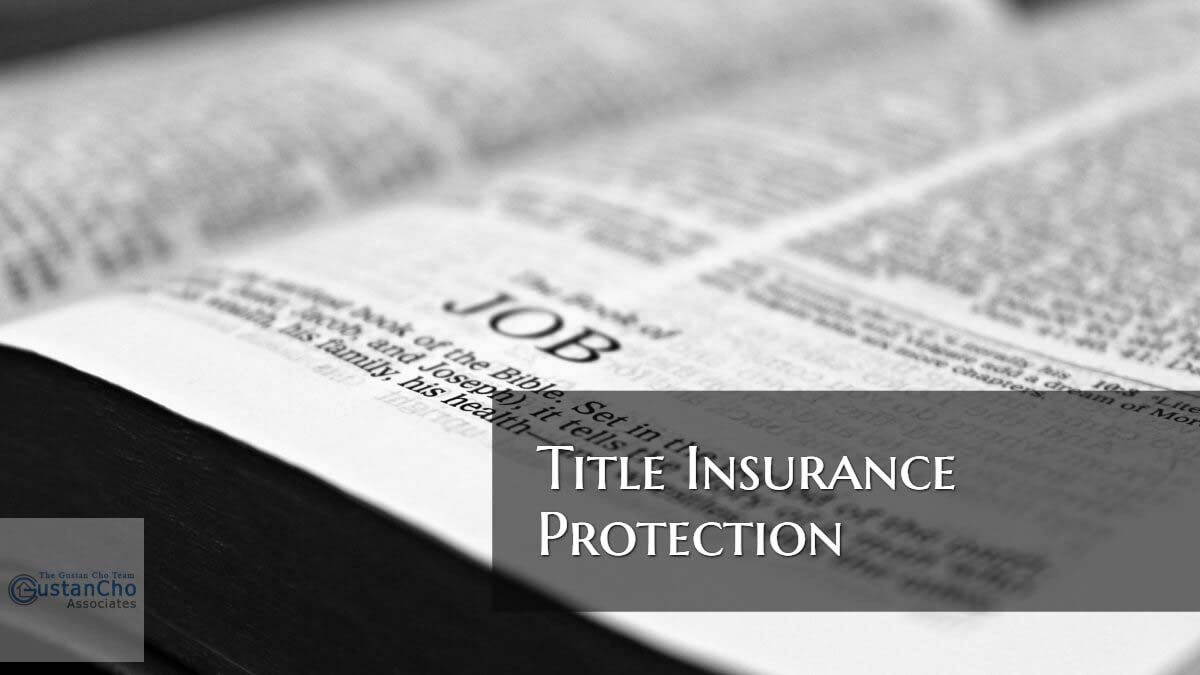Title Insurance Protection Is Required By All Lenders
In this article, we will cover and discuss title insurance protection that is required by all mortgage lenders. We will cover what Title Insurance Protection is and why mortgage lenders require title insurance protection. Title Insurance Protection insures that the “record” title is good subject only to the exceptions expressly set out in the title insurance protection policy. In the following sections, we will cover title insurance protection. We will cover why all mortgage lenders require title insurance protection and why mortgage borrowers pay for title insurance.
What Is Title Insurance?
Title insurance is a kind of insurance that protects homebuyers and lenders from legal property ownership problems. It also insures against certain matters which do not appear on the record, such as forgery, identity of parties, incompetence and negligence of former owners, the interest of missing heirs, status of individuals not having the “right” to sell property, and other flaws in the title of the property.
What Does Lender’s Title Insurance Cover?
Because title insurance protection is required by all lenders, the lender’s policy will protect their loan amount not your equity. It covers issues such as errors in public records, unknown liens (like unpaid taxes or contractor bills), forged documents, undisclosed heirs, illegal deeds or transfers, and conflicting wills or ownership claims. These are just a few reasons why title insurance protection is required by all lenders in every mortgage transaction.
Purpose of Title Insurance
Title insurance insures properties and its purpose is that the title to the property is free and clear and recorded. Title policy needs to abide by instructions given by lenders with the only exceptions are the line items express on the policy. A common Title Insurance Frequently Asked Questions is does the title company insure blemishes on the title that do not appear on public records of the title? Examples of blemishes not reported on the title are items such as the following:
- forgery interest of missing heirs who have claims to the property
- identification of parties, people who have no right to sell the subject property
- mistakes on title made by previous owners
Types Of Title Insurance
Lender’s title insurance and owner’s title insurance. Title insurance for mortgage lenders title insurance is called a Loan Policy. As previously state, most lenders require a Loan Policy when they issue a mortgage loan. The Loan Policy is usually based on the dollar amount of the loan. Loan Policy protects the lender’s interests of the property should a problem with the title arise. It does not protect the home buyer. The policy amount decreases each year and eventually disappears as the loan is paid off.
Owner’s title insurance is recommended because lender’s insurance won’t protect homeowners personally if the insurance company loses a battle over legal title.
Borrowers will be required to pay for the continued fight over the title and could lose their investment in the property. Borrowers can purchase basic or enhanced owner’s title insurance, with the enhanced title insurance policy offering more coverage for things like mechanic’s liens or boundary disputes. While the title insurance covers homeowners for things such as mistakes in the legal description of the property or human error, be aware that the title insurance will have some exclusions particularly in cases where violations of building codes occur after you bought your home.
What Is Owner’s Title Insurance Policy?
The title company will run public searches to see that the title to the home is free and clear from any adverse items but there is no guarantee that certain liens always come up.
- An owner’s title policy is required by mortgage lenders in the event if the title comes up clean
- But later some unforeseen title issues come up
- With the owner’s title policy provides coverage in the event if this is the case
- The face value of the owner’s title insurance policy is the purchase price of the property
- The owner’s title policy lasts for the duration on the subject property owner and there are no monthly payments
- The title company will charge a one time fee at closing
The owner’s title insurance policy will protect homeowners in the event if an heir to the property all of a sudden claims the title to the property and it will cover the legal defenses.
Mortgage Lenders Title Insurance Policy

Besides the owners’ title insurance policy, there is also the Lenders title insurance policy. A lenders title policy does not protect the buyer but the lender should any title problems arise after closing and it is normally the mortgage loan amount. On cases where a borrower refinances their current mortgage loan, the lender is going to require updated lenders title insurance policy but not new owners title insurance policy. New lenders’ title insurance policy is still required if homeowners are refinancing with the same lender or they have just recently purchased home
Why Title Insurance Protection Is Required by All Lenders
When a lender gives you a mortgage, they’re taking a financial risk. The home serves as collateral for the loan. The lender’s interest could be at risk if there’s a title issue—like a past-due tax lien, a forged signature on a deed, or an unknown heir claiming ownership. That’s why all lenders require title insurance protection. It ensures the lender is covered if title problems arise after closing.
Shopping For Title Insurance & Reissue Rate
Unlike other types of insurance, title insurance is paid with a single premium at the home closing.
- Home Buyers who are buying a resale or refinancing, they may be eligible for a “reissue” rate
- This could offer a substantial discount off the regular premium
- This is because the title policy is already in effect, and the title research has already been completed
- In some states, title insurance premiums are the same no matter who
- But in the majority of states, mortgage borrowers can save money by shopping around
- Get recommendations from lenders, attorneys, realtors, and friends
- Be sure to check out the license and reputation of different companies online
Always compare the features of each policy and get adequately covered where the homeowners are protected.
Things Title Insurance Companies Does Not Insure
Here are subjects that title companies do not normally insure. The title company will not insure issues not revealed through public records search such as unrecorded easements. Unrecorded liens and money due are not covered. Rights to utility ways that are not recorded are not covered. Unrecorded private and/or public roads are not covered. Any other types of encumbrances are not covered. Unrecorded rights and claims by people in possession of the subject property who are not recorded on public records are not covered.
Can Protection Be Obtained On Matters Not Recorded?
Upon application, the company issuing a new title can cover issues that are not revealed nor disclosed by inspection or survey of the subject property. Title companies will assess a special extra fee for an intense physical inspection of the property to check on flaws or blemishes on the title that are not recorded. Title companies call this extended coverage.
What’s the Difference Between Lenders and Owner’s Title Insurance
When we say that all lenders require title insurance protection, we refer to the lender’s title insurance policy. This protects the mortgage company, not you, the homeowner.
Lender’s Title Insurance:
- Required for all mortgage loans
- Protects the lender’s financial interest
- Expires when the loan is paid off
Owner’s Title Insurance:
- Optional but highly recommended
- Protects you if a title issue arises after closing
- Lasts as long as you own the home
While all lenders require title insurance protection, getting owner’s title insurance is a smart move to protect your equity and peace of mind.
Frequently Asked Questions: Title Insurance Protection Is Required By All Lenders
1. What is title insurance?
Title insurance protects against any legal claims, liens, or ownership disputes related to your property. It ensures the title (ownership record) is clear and free of problems when you buy a home.
2. Why is title insurance protection required by all lenders?
Title insurance is require by lenders to protect their investment in case there’s a title issue after closing. If someone later claims ownership or if a lien surfaces, the lender’s title insurance covers their financial interest.
3. Is title insurance the same for lenders and buyers?
No. There are two types of title insurance:
Lender’s policy (required by all lenders)
Owner’s policy (optional, but highly recommended to protect you)
The lender’s policy only protects the lender, not you as the buyer.
4. Do I have to buy title insurance if I’m paying cash?
You’re not required to get title insurance if you’re paying cash. However, since title insurance protection is required by all lenders, it becomes mandatory when you finance the home through a mortgage.
5. What does title insurance cover?
It covers:
- Unknown liens
- Forged documents
- Errors in public records
- Ownership disputes
- Missing heirs or conflicting wills
- It’s a key part of your protection, which is why title insurance protection is required by all lenders during closing.
6. How much does title insurance cost?
Title insurance is a one time fee at closing and does not require ongoing payments. Costs vary by state but typically range from $500 to $1,500, depending on the loan amount and property value.
7. Do I need both lender’s and owner’s title insurance?
Lenders require their own policy. The owner’s policy is optional, but it’s strongly recommended. Without it, you have no protection if a title issue arises after you buy the home.
8. Who chooses the title insurance company?
In many states, the buyer can choose the title company. However, some sellers may negotiate to use a preferred provider. No matter who chooses, title insurance protection is required by all lenders as part of your closing.
9. Is title insurance a recurring cost?
No. Title insurance is a one-time payment made at closing and covers you for as long as you own the home.
10. Can title problems really happen after I close?
Yes. Issues like unpaid taxes, forged documents, or recording errors can arise after closing. This is precisely why title insurance protection is required by all lenders—to protect against costly surprises.







